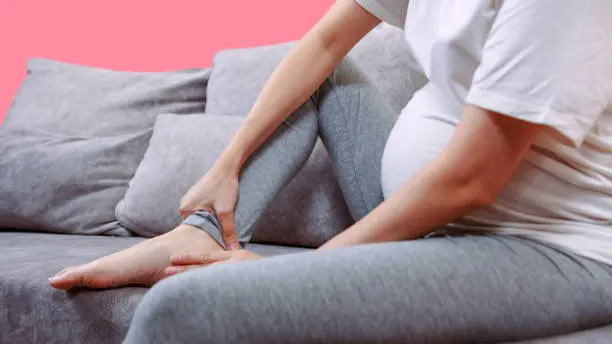Many women suffer from swollen extremities during pregnancy, especially in the final months, as a result of the natural changes occurring in the body.
This swelling can be annoying, but in most cases, it's not dangerous. However, it's important to know its causes and how to deal with it to alleviate symptoms and achieve a more comfortable pregnancy.
Causes of Swelling in the Extremities During Pregnancy

Pregnancy causes changes that affect circulation and fluid retention, including:
- Increased blood volume and fluid in the body to support the growth of the fetus.
- Dilation of blood vessels due to hormones.
- Slower return of blood from the extremities to the heart due to pressure from the uterus.
How does uterine pressure affect the extremities?
The enlarging uterus compresses major veins, impeding blood flow:
- The uterus compresses the inferior vena cava.
- Fluid accumulation in the legs and ankles.
- Swelling worsens at the end of the day or with prolonged standing.
Factors that Increase Swelling During Pregnancy
Not all women suffer to the same degree, and there are factors that may exacerbate the condition, including:
- Standing or sitting for long periods.
- Hot weather and high humidity.
- Lack of water intake.
- Excessive weight gain during pregnancy.
The difference between normal and dangerous swelling
Some signs of swelling may indicate serious health problems, such as:
- Sudden or severe swelling.
- Swelling accompanied by headaches or vision problems.
- Swelling of only one hand or face.
- These symptoms may indicate preeclampsia, and you should consult a doctor immediately.
The effect of diet on extremity swelling
Diet plays an important role in reducing or increasing swelling by:
- Reducing salt and processed foods.
- Increasing potassium-rich vegetables and fruits.
- Drinking adequate amounts of water.
- Avoiding caffeine and carbonated drinks.
The best home remedies to reduce swelling during pregnancy
Some simple habits can help reduce fluid retention, such as:
- Elevating your feet when sitting or sleeping.
- Avoiding prolonged standing or sitting without movement.
- Wearing light compression stockings.
- Applying cold compresses to swollen areas.
The Role of Light Exercise in Treating Swelling of the Extremities
Regular physical activity helps improve blood circulation, such as:
- Daily walking for 20–30 minutes.
- Stretching and yoga exercises for pregnant women.
- Moving the feet regularly when sitting.
- Swimming helps reduce pressure on the joints.
The Importance of Proper Clothing to Reduce Swelling
Choosing appropriate clothing affects blood circulation and reduces the severity of swelling, such as:
- Avoid tight clothing around the waist or ankles.
- Wear comfortable shoes without heels.
- Choose maternity socks.
- Wear light, breathable cotton clothing.
Does drinking water treat swelling of the extremities during pregnancy?

Despite swelling, water is essential for reducing fluid retention, as it:
- Helps maintain fluid balance in the body.
- Prevents sodium retention.
- Reduces the risk of urinary tract infections.
- It is recommended to drink at least 8–10 glasses of water daily.
When should you consult a doctor about swelling?
Not all cases of swelling are normal, and some require urgent medical attention:
- Sudden or asymmetric swelling.
- Difficulty breathing or chest pain.
- High blood pressure or protein in the urine.
- If there are symptoms of preeclampsia.
Article Summary
Extremity swelling during pregnancy is a normal condition resulting from hormonal changes and the pressure of the growing uterus, but it remains uncomfortable for many women.
It can be alleviated by following a healthy diet, drinking adequate amounts of water, and regularly exercising, along with resting and elevating the legs. However, if the swelling appears suddenly or is accompanied by abnormal symptoms, a doctor should be consulted immediately to ensure there is no serious medical condition.